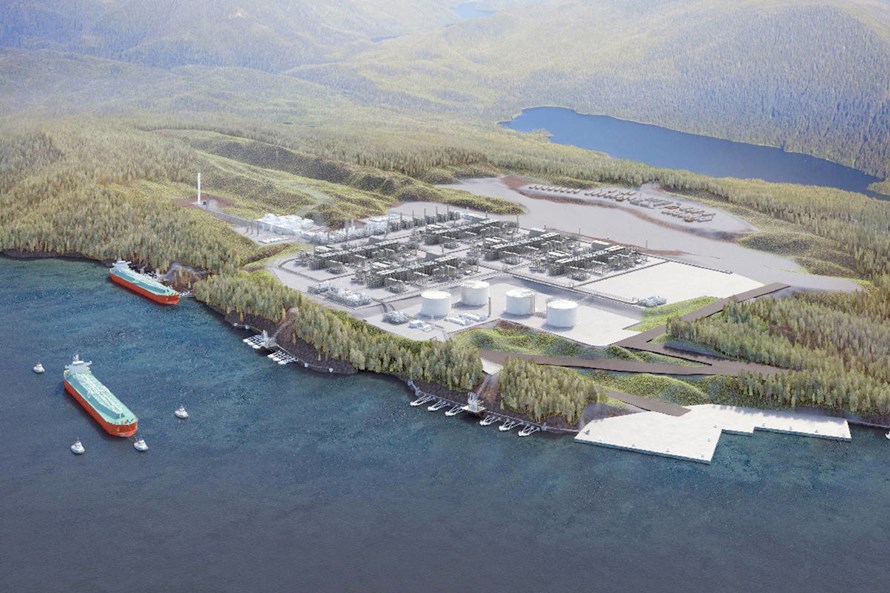The decision by Exxon Mobil Corp. to pull out of its environmental assessment application for a $25 billion liquefied natural gas (LNG) export facility on B.C.’s northwest coast has sent a chill through the resource industry – and underlines fears regarding Canada’s dwindling foreign investments.
Company spokeswoman Julie King said Exxon Mobil and partners withdrew the WCC LNG project from the environmental process after careful review.
Exxon Mobil and its Canadian partner Imperial Oil Ltd. had proposed the project for Tuck Inlet near Prince Rupert.
King didn’t say why the application was withdrawn, but foreign investment analysts are not surprised by the move.
Canada’s shortcomings in attracting foreign direct investment (FDI) are gaining a toxic reputation in international markets, they say.
“Some of our potential investors from Europe rank Canada as low as Iran and Kazakhstan in terms of [FDI approval] processes, and that’s not a good thing for Canada,” said Shawn Denstedt, vice-chairman for Western Canada with Osler, Hoskin & Harcourt LLP. “What we hear in particular is that the regulatory burden in Canada is material, and that discourages investment.”
Experts say the main problem is an anti-FDI attitude that has bled into current Canadian regulations.
Statistics Canada reports that 2017 FDI in Canada fell to its lowest point since 2010, down 26 per cent to $33.8 billion. Also alarming was that much of the investment Canada reported was reinvested from existing operations.
Economist Daniel Schwanen, C.D. Howe Institute’s vice-president of research, cautioned that, while Canada’s investment environment has improved in the last decade, some regulations still unfairly penalize foreign investors for wanting to do business in Canada.
That was the premise of a paper published by C.D. Howe and Schwanen last July. It called for Ottawa to eliminate the country’s restrictions on share ownership and to replace the current “net benefit” test, which requires an investor to prove an investment’s benefits to Canada, with a system that puts the onus on government to prove detriment to national interests before rejecting an investment.
The net-benefit rule change, Schwanen said, is particularly important because it signifies Canada’s traditional doubt over foreign investors.
According to Denstedt, the Trans Mountain pipeline debate has also validated the concerns of some investors that political interference and Indigenous consultation create significant uncertainty for major capital project approval in Canada.
Denstedt noted that major projects that would take two to four years to go through Canada’s approval process would take six to nine months in a competing FDI market like Australia.
“Every time there’s a delay in getting projects approved, that costs them money,” Denstedt said. “Investors’ interest in Canada is still strong, but we are in competition with places like Australia and the United States, and I think it’s fair to say their regulatory burdens are less, and their processes have more certainty to them.”
Simon Fraser University professor emeritus Herbert Grubel agreed that Ottawa can’t look at its FDI policies in a vacuum when other jurisdictions are constantly changing regulations to attract inbound investment.
Grubel noted that, for all of U.S. President Donald Trump’s harsh protectionist and anti-immigration stances, his administration’s lowering of corporate tax rates to 21 per cent from 35 per cent in 2017 spoke loudly to investors looking strictly at their bottom lines.
When combined with the challenges the Trans Mountain pipeline project is facing in getting its project through B.C., as well as directives such as the limitation of future oil extraction in Alberta, it’s not surprising that foreign investors are having second thoughts about Canada, he suggested.
“It’s clearly indicated that we’ve had trouble getting product to market, so as a result, investment – especially in oil exploration – has certainly gone down,” Grubel said.
Denstedt added that Ottawa has to address the country’s project regulatory approval process.
“What capital wants is certainty. It’s important to remember that energy and resource development in Canada is a regulated industry. It’s not prohibitive, and we can still develop natural resource projects; so we should focus on the regulation of that industry, rather than the prohibition,” Denstedt stated.
A key issue is Bill C-69, a federal ruling that would replace the National Energy Board with the Canadian Energy Regulator and create a new Impact Assessment Agency. The bill would introduce new timelines and require specific steps that companies must take in order for new energy projects to go ahead. Some, apparently, have had enough.
In 2018, Calgary-based Imperial took a writedown of $289 million on its northern B.C. Horn River shale gas development.



